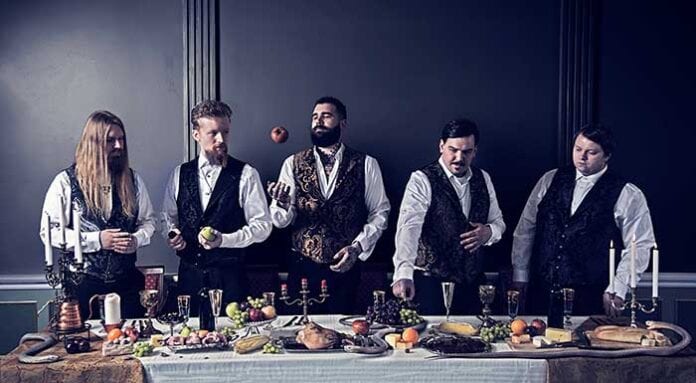
INTERVIEW WITH MARIO INFANTES ÁVALOS
BY KEVIN STEWART-PANKO
PHOTOGRAPHS BY VOID REVELATIONS AND MARÍNÓ FLÓVENT
Coming straight outta Reykjavik, Iceland and gripping on to the silver-plated reins of a bronco bucking to the sounds of wiry, technica, and melodic death metal comes Cult of Lilith. The sounds of the band’s debut full-length, Mara, marries influences from 18th Century classical music, 20th Century Gothenburg scene, and 21st Century tech-death, essentially keeping one foot in the past as they stretch the commonly accepted boundaries set by the likes of Fleshgod Apocalypse, Necrophagist, Obscura, and the early works of In Flames and Dark Tranquillity. Further adding to the sound and concept they have christened “necromechanical baroque” are interjections of space age oddities, 70s prog keyboard outbursts, a full-stop flamenco serenading, and a tortured aristocrat dress sense.
The band’s first EP, 2016’s Arkanum, wasn’t actually a band endeavor. Cult of Lilith began as the solo project of guitarist Daniel Þór Hannesson who wrote all the material for that first release before hiring session players to realize his dream. A positive response from the extreme music community drove Þór Hannesson to round out the Cult of Lilith lineup with full-time members. Joining him are fellow guitarist Kristján Jóhann Júlíusson, bassist Samúel Örn Böðvarsson, drummer Kjartan Harðarson, and vocalist Mario Infantes Ávalos, who we caught up with a couple weeks after the release of Mara via Metal Blade.
The band’s frontman is not only Cult of Lilith’s newest member, but he’s also the only non-Icelander in the band. This last point is important to note as he has an unusual story about coming to reside in Iceland and fronting one of the nation’s most exciting metal bands. Thusly, our interview often strayed from topics pertaining directly to the band and their new album towards those concerning moving from sunny Spain to icy Iceland, dying and thriving languages, and the system shock of perpetual daylight.
As I understand it, you have a pretty unique history as it applies to your involvement in Cult of Lilith?
I’m originally from the south of Spain, but I moved to Iceland four years ago. At some point in 2017 or 2018, I posted something on a musician’s Facebook group here in Reykjavik offering my services as a vocalist, and Daniel contacted me. He showed me the demos of Mara and the song “Purple Tide,” and as soon as I heard that song I was in.
Did you originally move to Iceland for musical or personal reasons?
It was all personal reasons. I didn’t even have a band in Spain before I moved to Iceland and I had no plans to find a band in Iceland. I just moved here because I liked the place, strangely enough. Iceland works for some people, but it’s not for everyone. I’ve seen so many people become sick of the country and the weather, but for some of us it does work and I’m pretty happy here.

How did you pull off the move? Usually, moving from one country to another like that comes down to marriage or a job offer.
If you’re European, it’s super easy. You literally don’t have to do anything at all (laughs). I grabbed my shit, grabbed a flight, and came here. It was that easy.
What attracted you to Iceland?
I think that some people are attracted to their opposites, and Iceland is exactly the opposite of the south of Spain (laughs). I’ve always been very interested in very remote places, isolated places, and cold places, and Iceland ticks all those boxes. It doesn’t work for everyone and I’m not saying that I don’t like Spain. I do like Spain and I miss the good food, the good weather, and my family, of course, but I like it here.
“I’VE ALWAYS BEEN VERY INTERESTED IN VERY REMOTE PLACES, ISOLATED PLACES, AND COLD PLACES”
Has it been everything you expected, and what’s been the most difficult adjustment?
I didn’t know much about the place beforehand. I should have done a lot more research before moving to another country (laughs). I’ve always had strange connections with strange places, and for many years I always knew that I would end up here. So, it was a very clear decision for me, but I had no clue what I was going to find here. The country has treated me very well, and I’ve been very lucky. There were a lot of things I wasn’t expecting for sure, but that’s something I mean in a good way. There haven’t been any bad surprises.
What’s been most surprising?
I knew the weather sucked, but my first winter here when everything was so dark was really shocking at first. Also, I know this now, but I also discovered during my first summer here that there’s no night at all. The sun is up the whole time and that was pretty weird, especially when you’re going to bed and it’s still super light out. That was weirder than the darkness in the winter when you only have three hours of daylight a day.
As far as Mara, how much of it was written by the time you got involved?
Instrumentally about 70 percent of the album was written, but vocally there was nothing—no lyrics, no vocal patterns, no vocal melodies. So, the vocals on the album were done from scratch by me. Instrumentally, Mara was pretty much conceived before I even joined the band.
“I HAD ALL THE FREEDOM IN THE WORLD TO DO MY VOCALS AND LYRICS”
With you being the new guy, when it came time for the vocals, were you mostly taking direction from the other guys or did you have free rein?
When I first joined the band, my only condition was that if I was going to join they had to let me do whatever the fuck I wanted (laughs). But they were okay with that and they gave me total freedom. Of course, everything we do in the band is taken to a vote. We vote on everything. Like, if someone is not comfortable with something, we will tell the others and speak our minds. We don’t want to have something on an album we don’t like. We all have freedom to do our parts, but if someone doesn’t like something, we say so. But I had all the freedom in the world to do my vocals and lyrics and everything.
Being the last member, and a Spaniard, to join the band, comprised of Icelanders, was it difficult fitting in personally and culturally?
Oh yeah, for sure! Of course, with it being a new band, new people, and a completely new culture, it was a bit strange at the beginning. It was also a good way to understand Icelandic people because I spent a lot of time with them, seeing how they socialized and how it’s very different from how Spanish people socialize and behave around other humans. It’s a very different approach, but I would say it was very good for me, actually, to find them and go right into the band, be surrounded by four Icelanders, create with them, discussing stuff with them, and talking every day.
Most Icelanders speak English, but were there communication problems initially?
Yeah, everyone here actually speaks beautiful English and in the band we always speak English together. I actually encourage them to speak Icelandic sometimes so I can pick things up and learn, but when it comes to the important stuff, everything is in English. But, the way they would express stuff was very different from Spanish people. I’m not just talking about the language itself.
I actually got obsessed with a couple of Icelandic TV shows on Netflix last year—Trapped and Case—and it’s a pretty difficult language to learn.
I haven’t seen Case, but Trapped is fucking awesome! And yes, it is a fucking difficult language! I’ve been here for four years and I should speak way more than I do now (laughs). I can speak basic Icelandic—enough to survive—but the fact that everyone speaks English is both a curse and a blessing. It makes communication easier, but it makes the process of learning Icelandic difficult because everyone switches between English and Icelandic so immediately. It’s not like in Spain where no one speaks English. If you’re a foreigner and you move to Spain, you either learn Spanish or you can’t communicate. But I’m trying (laughs). Unfortunately, there are concerns about the language dying out. It’s a small language and English is getting bigger and bigger here with the internet and iPhones and whatever. I think it’s pretty sad when I see Icelandic kids here speaking English to each other. You’d never see that in Spain. You’d see kids using some English words and phrases because of video games and shit, but they would never speak English to each other. Here, you see that and it’s like, “Why don’t you use your language?” I understand why people are concerned about the language dying out.
“IT’S A VERY NICE TOUCH AND IT’S SOMETHING THAT I’VE ALWAYS LIKED TO DO. I’M NOT FORCING IT INTO THE MUSIC.”
I’m going to take a wild stab and guess that the Spanish language songs and the flamenco sequences on the album are your doing?
It’s funny, some people think that the stuff I’m singing in Spanish is Italian, but it’s Spanish. Everyone was absolutely comfortable with it, but I also said that when I joined the band I wanted to do weird shit and they were fine with it. They were fine with the different usage of languages, and I think it’s a very nice touch and it’s something that I’ve always liked to do. I’m not forcing it into the music. I love languages so why wouldn’t I use them in my art?
Aside from yourself, is there much of a Spanish presence in Iceland?
Actually, one of the fanciest restaurants in Iceland is a Spanish restaurant (laughs). They mix the concept of tapas with Icelandic food. Also, they love Spain here because everyone goes on holiday there, and there actually are a few thousand Spaniards in Reykjavik.
When did Metal Blade come into the picture?
That was right after we finished the album. Dave Otero produced the album, and when it was finished and he sent the album to us, he also told us he thought it was good shit and that he thought the people at Metal Blade needed to hear it. We thought he was just trying to be nice to us and that was something he said to every band so we would work with him again in the future, but a few days after he told us that we got an email from Metal Blade telling us they listened to a couple of songs and were very interested in working with us and that’s how it went. There were a few months of negotiations. We didn’t just take the first deal they offered. They are incredibly nice to us, but you can never accept the first deal and you need to counter negotiate. It was a few months before we reached an agreement that we were both super-comfortable with.
“THE ATTIRE, THE MUSIC, AND THE CONCEPT GO INTO WHAT IS THE UNIVERSE OF THE BAND.”
What does the band’s Renaissance/ornate dress style and image represent?
That was always the concept of the band. Even before the album was released, we would go full-on with the attire. We like to call the genre of the band “necromechanical baroque” and that appeals to not just the music, but the image, and I think they go hand in hand. I think it fits well with that idea and I wouldn’t feel comfortable playing the music we play in Cult of Lilith in normal t-shirt and jeans. I feel way more comfortable playing our music with the attire on. The attire, the music, and the concept go into what is the universe of the band.
The character of Lilith has many different backgrounds, meanings, and mythologies. Which interpretation of Lilith would you say speaks most to you?
Hmm, to me personally, I think it’s very interesting that she was supposed to have been the first feminist in human history. Well, not history because it’s fictional, but at least in a literature sense because she rejected Adam, rejected heaven, and was considered a heathen because Adam wanted to have sex in missionary position and she wanted to be on top and God didn’t like that. She refused heaven, went to Earth refusing God and Christianity and everything, and I think that’s super-interesting. I also think it’s interesting that a feminine figure is the center of a metal band because metal is normally very male dominated. It’s interesting to give it that feminine touch even though we are all white, cis, heterosexual dudes.
What would you say are the differences between the metal scenes in Spain and Iceland?
Iceland is a very small country. There are only 360,000 people here, but for such a small country, the standards are very high and people are so fucking talented. People take care of their art and it’s amazing. They have a very healthy scene for such a small country. In Spain, there are many, many, many more bands, but the standards aren’t that high, even though there are some amazing artists in Spain. For being so small and isolated, there are a lot of sick artists here, not just in music either. There’s a 100 percent literacy rate here, and I think it’s the country that has the most writers per capita in the world.
“EVERYTHING IS UNPREDICTABLE. AT THE MOMENT, WE’RE FOCUSING ON CREATING CONTENT THAT’LL KEEP PEOPLE ENGAGED TO THE BAND”
Cult of Lilith played an actual show in an actual venue recently, whereas in most countries around the world, venues aren’t even open, let alone operational and hosting gigs?
Yeah, we played in Reykjavik last Saturday. In Iceland, the whole COVID thing has been okay. There have only been ten or so deaths since the start of it, whereas Spain I think is around 30,000 now. Being such an isolated island, it makes the whole thing easier to handle, especially since they closed the borders to tourists, which is a good thing for stopping COVID, but not so great for the economy and tourism though. It’s pretty controlled here. Our original plan was to release the album and tour, but like everyone else, we’re just waiting. We’re hearing offers about tours and stuff, but nothing is going to happen any time soon and no one knows when or what to do. Everything is unpredictable. At the moment, we’re focusing on creating content that’ll keep people engaged to the band and the album—videos, play throughs, official promo videos to remind people we exist, which isn’t easy. Of course, we’ll be touring whenever it’s possible.
What have the reactions to Mara been like so far?
Honestly, it’s been super-exciting. The thing with Metal Blade is that we reach more people. If we released the album independently we probably would have gotten some good reviews, but the reach that you get with Metal Blade is immense. There are a lot more people who have heard the album now, the reactions and reviews have been overly positive, and it’s super-exciting to see musicians you respect in the scene saying our album is sick and stuff. It’s been amazing, and we’re all very excited.




















